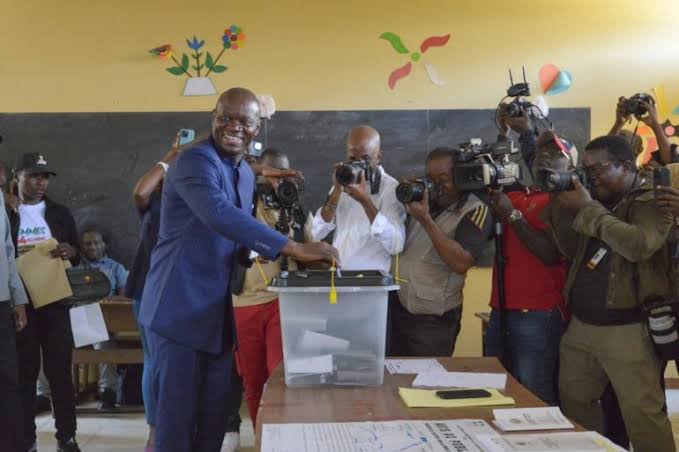Brice Oligui Nguema, Gabon’s transitional military leader, has been declared the winner of the country’s presidential election with a commanding lead, based on preliminary figures released by the Interior Ministry.
Recall that MCC had reported that Nguema, who took power in a 2023 coup, reportedly garnered around 90 per cent of the votes cast on Saturday, leaving his closest challenger, former Prime Minister Alain Claude Bilie-By-Nze, with a mere three per cent.
His sweeping victory was widely anticipated.
Nguema played a pivotal role in ending more than five decades of Bongo family rule, positioning himself as a national reformer in a field of eight candidates.
While Bilie-By-Nze raised concerns about possible irregularities during the vote count, Nguema defended the process as “transparent.”
A Pledge to Rebuild
In his first international interview following the election, Nguema told Al Jazeera he is committed to returning power and resources to the people.
“What was taken from the people will be returned,” he said, emphasizing his goal of restoring dignity to Gabonese citizens.
He also touted the country’s evolving foreign policy, claiming diplomatic gains during the transitional period.
According to Nguema, Gabon has strengthened its international ties with global powers including the United States, France, Russia, and China.
He highlighted the establishment of new embassies from the UK and India, with Serbia and the UAE expected to follow.
“These developments reflect significant progress in less than two years,” Nguema said. “This is a collective achievement for all Gabonese.”
Old System, New Face?
Reporting from Libreville, Al Jazeera’s Ali Hashem noted that the election outcome surprised no one, but the real test lies ahead as Nguema assumes control of a country long dominated by a patronage-driven political system.
Under the Bongo dynasty, wealth and power were concentrated among elites, leaving much of the population marginalized despite Gabon’s abundant oil, gold, and mineral resources.
The country, with a population of about 2.2 million, is also part of the ecologically critical Congo Basin.
Yet nearly 40 per cent of Gabonese youth remain unemployed, according to 2024 World Bank statistics.
Citizens are increasingly demanding urgent improvements in essential services such as electricity, food supply, and job creation.
Skepticism Persists
Nguema, who once served as head of the Republican Guard under Ali Bongo, ran on a platform of anti-corruption, economic diversification, and investment in agriculture, tourism, and industry.
His campaign slogan, “We Build Together,” resonated with many — but not all are convinced of genuine change.
Despite the increase in voter participation to 70.4 per cent — up from 56.65 per cent in the contested August 2023 election — doubts remain.
Observers question whether Nguema’s rule marks a true break from the past or simply a continuation under a new banner.
“Both Nguema and his main opponent were prominent figures in the previous administration,” Hashem pointed out. “It’s unclear if this represents reform or a repackaging of the old guard.”
Economic Pressure and Global Scrutiny
With international debt reaching $3 billion, Gabon faces growing pressure to prove its commitment to democratic governance and economic reform.
The World Bank reported a modest economic growth of 2.9 per cent in 2024, driven by investments in infrastructure and increased production of oil, timber, and manganese.
As Nguema embarks on his new seven-year term — renewable once — global eyes remain fixed on Libreville, watching to see whether his promises will translate into meaningful progress or fall into the patterns of the past.


